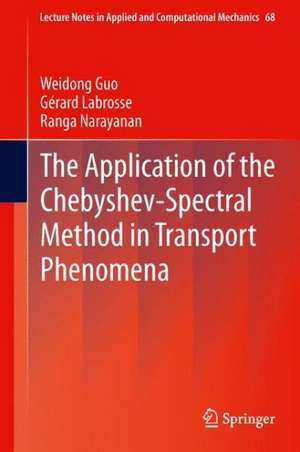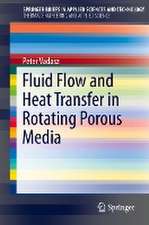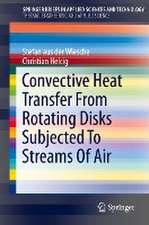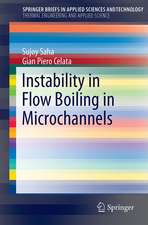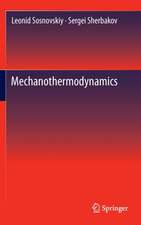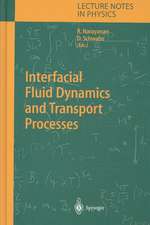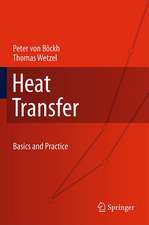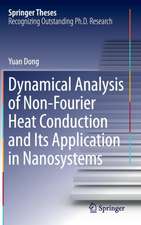The Application of the Chebyshev-Spectral Method in Transport Phenomena: Lecture Notes in Applied and Computational Mechanics, cartea 68
Autor Weidong Guo, Gérard Labrosse, Ranga Narayananen Limba Engleză Hardback – 27 ian 2013
The book is meant principally to train students and non-specialists to use the spectral method for solving problems that model fluid flow in closed geometries with heat or mass transfer. To this aim the reader should bring a working knowledge of fluid mechanics and heat transfer and should be readily conversant with simple concepts of linear algebra including spectral decomposition of matrices as well as solvability conditions for inhomogeneous problems.
The book is neither meant to supply a ready-to-use program that is all-purpose nor to go through all manners of mathematical proofs. The focus in this tutorial is on the use of the spectral methods for space discretization, because this is where most of the difficulty lies. While time dependent problems are also of great interest, time marching procedures are dealt with by briefly introducing and providing a simple, direct, and efficient method.
Many examples are provided in the text as well as numerous exercises for each chapter. Several of the examples are attended by subtle points which the reader will face while working them out. Some of these points are deliberated upon in endnotes to the various chapters, others are touched upon in the book itself.
| Toate formatele și edițiile | Preț | Express |
|---|---|---|
| Paperback (1) | 385.08 lei 6-8 săpt. | |
| Springer Berlin, Heidelberg – 26 iun 2015 | 385.08 lei 6-8 săpt. | |
| Hardback (1) | 423.84 lei 6-8 săpt. | |
| Springer Berlin, Heidelberg – 27 ian 2013 | 423.84 lei 6-8 săpt. |
Din seria Lecture Notes in Applied and Computational Mechanics
- 19%
 Preț: 422.94 lei
Preț: 422.94 lei - 18%
 Preț: 1008.12 lei
Preț: 1008.12 lei - 18%
 Preț: 1120.18 lei
Preț: 1120.18 lei - 20%
 Preț: 560.79 lei
Preț: 560.79 lei - 18%
 Preț: 948.16 lei
Preț: 948.16 lei - 15%
 Preț: 643.65 lei
Preț: 643.65 lei - 18%
 Preț: 956.81 lei
Preț: 956.81 lei - 18%
 Preț: 957.62 lei
Preț: 957.62 lei - 15%
 Preț: 649.87 lei
Preț: 649.87 lei - 18%
 Preț: 1224.54 lei
Preț: 1224.54 lei - 18%
 Preț: 956.50 lei
Preț: 956.50 lei - 18%
 Preț: 954.45 lei
Preț: 954.45 lei - 18%
 Preț: 948.92 lei
Preț: 948.92 lei - 18%
 Preț: 949.55 lei
Preț: 949.55 lei - 15%
 Preț: 644.49 lei
Preț: 644.49 lei - 18%
 Preț: 1234.62 lei
Preț: 1234.62 lei - 18%
 Preț: 777.69 lei
Preț: 777.69 lei - 18%
 Preț: 1221.83 lei
Preț: 1221.83 lei - 15%
 Preț: 643.00 lei
Preț: 643.00 lei - 18%
 Preț: 956.33 lei
Preț: 956.33 lei - 15%
 Preț: 640.88 lei
Preț: 640.88 lei - 15%
 Preț: 645.79 lei
Preț: 645.79 lei - 18%
 Preț: 944.99 lei
Preț: 944.99 lei - 18%
 Preț: 956.18 lei
Preț: 956.18 lei - 18%
 Preț: 1236.69 lei
Preț: 1236.69 lei - 18%
 Preț: 953.97 lei
Preț: 953.97 lei - 15%
 Preț: 640.88 lei
Preț: 640.88 lei
Preț: 423.84 lei
Nou
Puncte Express: 636
Preț estimativ în valută:
81.10€ • 84.89$ • 67.50£
81.10€ • 84.89$ • 67.50£
Carte tipărită la comandă
Livrare economică 31 martie-14 aprilie
Preluare comenzi: 021 569.72.76
Specificații
ISBN-13: 9783642340871
ISBN-10: 3642340873
Pagini: 244
Ilustrații: XII, 229 p.
Dimensiuni: 155 x 235 x 19 mm
Greutate: 0.48 kg
Ediția:2012
Editura: Springer Berlin, Heidelberg
Colecția Springer
Seria Lecture Notes in Applied and Computational Mechanics
Locul publicării:Berlin, Heidelberg, Germany
ISBN-10: 3642340873
Pagini: 244
Ilustrații: XII, 229 p.
Dimensiuni: 155 x 235 x 19 mm
Greutate: 0.48 kg
Ediția:2012
Editura: Springer Berlin, Heidelberg
Colecția Springer
Seria Lecture Notes in Applied and Computational Mechanics
Locul publicării:Berlin, Heidelberg, Germany
Public țintă
GraduateCuprins
An Introduction to the Book and a Road Map.- An Introduction to the Spectral Method.- Steady One-Dimensional (1D) Heat Conduction Problems.- Unsteady 1D Heat Conduction Problems.- Steady Two-Dimensional (2D) Heat Conduction Problems.- 2D Closed Flow Problems - The Driven Cavity.- Applications to Hydrodynamic Instabilities.- Exercises for the Reader.- References.- Index.
Recenzii
From the reviews:
“This book contains an explanation of the Chebyshev collocation spectral method applied to several problems of transport phenomena … . The book is mainly addressed to graduate students in engineering or physicists who need to numerically solve problems involving partial differential equations. … the book might be interesting to mathematicians as it presents a lot of applications, and some practical implementation of the methods complements the theoretical studies. … The book is valuable, mainly due to its practicality.” (Henar Herrero, Mathematical Reviews, January, 2014)
“This book presents topics that guide the reader through various stages of the Chebyshev-spectral method to solve transport problems. … The book is written for the typical graduate student in engineering, or even for the physicist, that enjoys working with pencil and paper, and who wishes to use common software such as MATLAB, MATHEMATICA, or MAPLE.” (Titus Petrila, zbMATH, Vol. 1266, 2013)
“This book contains an explanation of the Chebyshev collocation spectral method applied to several problems of transport phenomena … . The book is mainly addressed to graduate students in engineering or physicists who need to numerically solve problems involving partial differential equations. … the book might be interesting to mathematicians as it presents a lot of applications, and some practical implementation of the methods complements the theoretical studies. … The book is valuable, mainly due to its practicality.” (Henar Herrero, Mathematical Reviews, January, 2014)
“This book presents topics that guide the reader through various stages of the Chebyshev-spectral method to solve transport problems. … The book is written for the typical graduate student in engineering, or even for the physicist, that enjoys working with pencil and paper, and who wishes to use common software such as MATLAB, MATHEMATICA, or MAPLE.” (Titus Petrila, zbMATH, Vol. 1266, 2013)
Textul de pe ultima copertă
Transport phenomena problems that occur in engineering and physics are often multi-dimensional and multi-phase in character. When taking recourse to numerical methods the spectral method is particularly useful and efficient.
The book is meant principally to train students and non-specialists to use the spectral method for solving problems that model fluid flow in closed geometries with heat or mass transfer. To this aim the reader should bring a working knowledge of fluid mechanics and heat transfer and should be readily conversant with simple concepts of linear algebra including spectral decomposition of matrices as well as solvability conditions for inhomogeneous problems.
The book is neither meant to supply a ready-to-use program that is all-purpose nor to go through all manners of mathematical proofs. The focus in this tutorial is on the use of the spectral methods for space discretization, because this is where most of the difficulty lies. While time dependent problems are also of great interest, time marching procedures are dealt with by briefly introducing and providing a simple, direct, and efficient method.
Many examples are provided in the text as well as numerous exercises for each chapter. Several of the examples are attended by subtle points which the reader will face while working them out. Some of these points are deliberated upon in endnotes to the various chapters, others are touched upon in the book itself.
The book is meant principally to train students and non-specialists to use the spectral method for solving problems that model fluid flow in closed geometries with heat or mass transfer. To this aim the reader should bring a working knowledge of fluid mechanics and heat transfer and should be readily conversant with simple concepts of linear algebra including spectral decomposition of matrices as well as solvability conditions for inhomogeneous problems.
The book is neither meant to supply a ready-to-use program that is all-purpose nor to go through all manners of mathematical proofs. The focus in this tutorial is on the use of the spectral methods for space discretization, because this is where most of the difficulty lies. While time dependent problems are also of great interest, time marching procedures are dealt with by briefly introducing and providing a simple, direct, and efficient method.
Many examples are provided in the text as well as numerous exercises for each chapter. Several of the examples are attended by subtle points which the reader will face while working them out. Some of these points are deliberated upon in endnotes to the various chapters, others are touched upon in the book itself.
Caracteristici
Concise, tutorial and application-driven primer Contains worked examples and end-of-chapter exercises Based on course-tested material at graduate level
